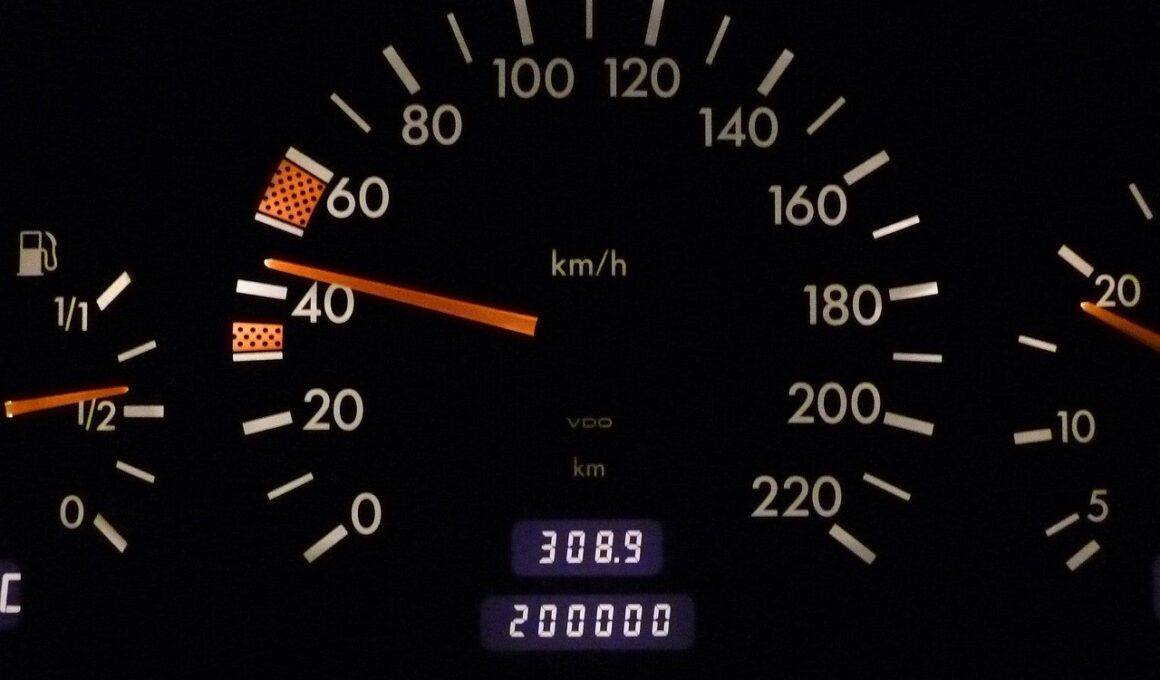The Impact of Mileage on RV Insurance Premiums
Understanding how mileage affects RV insurance premiums is crucial for every RV owner. Insurance companies take various factors into account when determining the cost of premiums. Higher mileage can be indicative of more usage, which translates to a greater risk of accidents or breakdowns. RV owners often plan longer trips compared to regular vehicle owners, leading to increased miles. Each insurance company may assess how these mileage levels impact their pricing structures differently. Additionally, other factors like the RV’s age, type, and value can also play significant roles. Insurance providers generally view higher mileage as higher risk, and thus premiums tend to increase with mileage. It’s beneficial for RV owners to accurately report their anticipated mileage and to choose coverage options that fit their specific usage patterns. Understanding your expected travel plans can help you select the best policy. Making informed decisions can effectively minimize your premiums. Furthermore, shopping around for quotes from multiple insurers can provide considerable savings. Online tools can assist in comparing rates. Engaging with an insurance expert may yield insights specific to individual RV needs, tailoring coverage efficiently.
Mileage not only affects the cost of insurance, but also the ways in which claims can be impacted. When you file a claim, the insurance company will likely inquire about the mileage at the time of the incident. If an accident occurs with unusually high mileage, it might complicate the claims process. In some circumstances, insurers may scrutinize your claims more closely if high mileage trends persist, raising flags about the potential for fraud or excessive use. Therefore, being transparent about how often you use your RV can enhance your credibility with your insurer. It’s essential to maintain a clear record of mileage logs or trip details if you frequently travel. Some insurers may offer discounts for low mileage, especially if the RV is used primarily for leisure or occasional trips. Owners should inform their insurers if they significantly reduce their travel or stay closer to home. Adjusting your insurance coverage to reflect your actual mileage can help in evening out premium costs. Always make sure to read through the policy fine print, as mileage exclusions might exist. Selecting a less active coverage plan could be beneficial for owners not using their RV often.
Mile Log Maintenance
Keeping a detailed mileage log serves as a beneficial practice for RV owners, not just for personal record-keeping but also for insurance purposes. Regularly tracking your mileage can provide insights into how often you utilize your RV and can assist in managing insurance expenses. Maintaining a log involves simply jotting down miles driven on each trip and the purpose behind those travels. This information can become pivotal when discussing premiums with your insurer. In addition to supporting claims, a detailed log reflects responsible usage of the RV, potentially leading to discounts. In times of audits or inquiries about usage, this documentation can save owners from disputes with their insurers. Depending on your insurer, a mileage-based pay-as-you-drive option may be available. This can dramatically reduce insurance premiums for those who do not rack up significant miles each year. Many insurance companies increasingly recognize the benefits of low mileage and reward their clients for mindful usage. Ultimately, developing and sustaining this habit of maintaining a thorough mileage log is a small effort that can yield significant savings and peace of mind regarding your insurance policy.
Moreover, the type of RV and its intended use also plays a substantial role in shaping insurance premiums influenced by mileage. Different classes of RVs—ranging from motorhomes to travel trailers—may have varied mileage thresholds that affect their premiums. Generally, larger RVs that are built for extensive travel may incur higher costs than smaller models, especially regarding mileage accumulation. For instance, if someone uses a large motorhome frequently for interstate vacations, their mileage could exceed typical limits for lower premiums. On the other hand, if an owner primarily uses their RV for weekend getaways locally, they would benefit from significantly lower mileage-based rates. It is also vital for RV owners to communicate with their insurance provider about how they plan to use their RV. Clarifying whether the RV is regularly used for long-distance travel trips or mainly for short family excursions can shape the pricing landscape. Insurers ideally want to personalize their offerings based on usage patterns. Properly classifying your RV and understanding these distinctions can certainly pave the way for more optimal insurance savings tailored to your needs.
Understanding Insurer Classification
Insurance companies utilize various classification methods to gauge risk associated with RVs, heavily influenced by annual mileage estimates. A commonly known classification is divided into categories such as pleasure use, commuting, or full-time living. Understanding these classifications can empower RV owners to advocate for better insurance premiums. In cases where owners primarily use their RV for recreational trips rather than everyday commuting, they may qualify for reduced mileage rates. Alternatively, insurers often analyze historical data to determine how mileage correlates with claims frequency. For example, data could reveal that vehicles used primarily for leisure and accumulating lower mileage often file fewer claims. Owners should be prepared to provide accurate information regarding usage types and intended mileage to ensure they secure affordable coverage. Additionally, reviewing and changing your classification as your RV use patterns evolve can lead to premia adjustments. It is beneficial to conduct annual reviews of insurance policies to ensure alignment with current usage to avoid overpaying. Interacting closely with the insurance company to clarify how specific mileage categories impact premiums can also provide the necessary insights for responsible RV insurance management.
Furthermore, understanding the geographical area of operation can also modify how mileage influences RV insurance premiums. Insurers will assess where the RV is primarily used, as some regions statistically yield higher risks than others, introducing another layer to the computation of insurance rates. For instance, RVs that frequently travel through high-traffic urban environments are likely to incur costs that reflect the increased likelihood of accidents. Conversely, those that stay within safer, less populated areas will enjoy more favorable rates due to lower risk profiles. Owners should be aware of their travel routes and communication with their insurance agent about these locations. It’s advisable to maintain open communication about changing travel plans or permanent relocations. Additionally, RV clubs and forums can offer communal knowledge about these regional risks, serving as a platform for shared experiences and advice amongst owners. When forming RV travel plans, understanding both the mileage and geographical factors can efficiently influence premium rates downwards, leading to the overall goal of achieving the most budget-friendly insurance while maintaining adequate coverage.
Conclusion
In conclusion, mileage undeniably has a significant impact on RV insurance premiums. From accurate record-keeping, and understanding RV classifications to recognizing regional risks, taking these variables into consideration enables savvy RV owners to manage their insurance costs effectively. By approaching insurance needs with a comprehensive understanding of how mileage relates to premiums, owners can make informed decisions that resonate with their usage patterns. Regular assessment of your insurance policy is essential, especially as travel habits and circumstances shift over time. Close communication with your insurer about intended mileage can also promote tailoring coverage for better financial outcomes. Moreover, leveraging the insights shared by fellow RV owners can enhance your knowledge base surrounding insurance practices. Adopting a proactive approach will likely lead to discovering discounts and additional savings alongside maintaining a safe and enjoyable experience on the road. Remember, an RV is an investment, and managing insurance wisely will help you protect that investment while enjoying countless adventures across the open roads. Stay informed and engaged about your RV insurance needs to enjoy peace of mind while you travel.
Engaging with an insurance expert can yield additional personalization necessary for your insurance coverage. Understanding the intricacies of RV insurance based on mileage allows you to align your personal driving habits with the best options available for your needs. Adopting this informative stance not only helps in estimating costs more accurately but also nurtures better relationships with health insurance providers. Thus, focusing on mileage as an integral factor equips you to reduce potential costs significantly while safeguarding your RV throughout its travels. By paying close attention to how mileage, type, and intended use factor in, RV owners can make confident decisions about their insurance policies.


